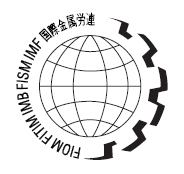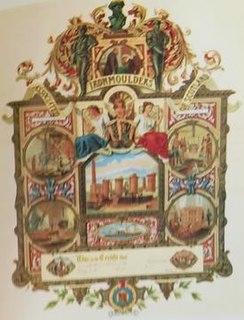Related Research Articles
In British politics, an affiliated trade union is one that is linked to the Labour Party. The party was created by the trade unions and socialist societies in 1900 as the Labour Representation Committee and the unions have retained close institutional links with it.

The International Metalworkers' Federation (IMF) was a global union federation of metalworkers' trade unions, founded in Zürich, Switzerland in August 1893. As of 2009, the IMF had more than 200 member organisations in 100 countries, representing a combined membership of 25 million workers.

The Ceramic and Allied Trades Union (CATU) was a trade union representing pottery workers in the United Kingdom.

The Amalgamated Engineering Union (AEU) was a major British trade union. It merged with the Electrical, Electronic, Telecommunications and Plumbing Union to form the Amalgamated Engineering and Electrical Union in 1992.
The National Association of Operative Plasterers (NAOP) was a trade union representing plasterers in the United Kingdom.
The National Amalgamated Union of Labour (NAUL) was a general union in the United Kingdom.
Sir William James Simpson, often known as Bill Simpson, was a Scottish trade unionist and political activist.
The Federated Moulders' (Metals) Union of Australia (FMMUA) was an Australian trade union which existed between 1899 and 1983. It represented moulders - skilled tradesmen who fabricated the moulds used to cast metal products in foundries. In spite of the union's exclusive attitude towards membership, which kept the total number of FMMUA members low throughout its existence, the vital position of moulders in major industries such as mining, manufacturing and the railways ensured that the union remained industrially powerful, and the union had a reputation for being highly militant.
Rowland William Casasola, known as "Roland", was a British trade unionist and political activist.
The Amalgamated Union of Foundry Workers (AUFW) was a trade union representing workers in foundries in the United Kingdom.
Jim Gardner was a Scottish trade unionist.

The Friendly Society of Iron Founders of England, Ireland and Wales (FSIF) was an early trade union representing foundry workers in the United Kingdom.

The Associated Iron Moulders of Scotland (AIMS) was a trade union representing foundry workers in Scotland.
The Associated Blacksmiths, Forge and Smithy Workers' Society (ABFSWS) was a trade union representing metalworkers in the United Kingdom and Ireland.
Robert Baxter Garland was a Scottish trade unionist.
George Bell was a British trade union leader, who served as general secretary of the General Federation of Trade Unions (GFTU).
The Amalgamated Moulders and Kindred Industries Trade Union was a trade union representing semi-skilled moulders in the United Kingdom.
James Fulton was a Scottish trade unionist.
Joseph Maddison was a British trade unionist.
The International Secretariat of Foundry Workers was a global union federation bringing together unions representing workers in metal foundries.
References
- ↑ Europa: The Encyclopædia of Europe, vol.1, p.116
- ↑ Archives Hub, "National Union of Foundry Workers"
- ↑ Jeremy Black, A History of the British Isles, p.310
- ↑ Parker, James (2017). Trade unions and the political culture of the Labour Party, 1931-1940 (PDF). Exeter: University of Exeter. p. 125.
- 1 2 3 4 5 6 7 8 9 10 11 Fryth, H. J.; Collins, Henry (1950). The Foundry Workers. Manchester: Amalgamated Union of Foundry Workers.